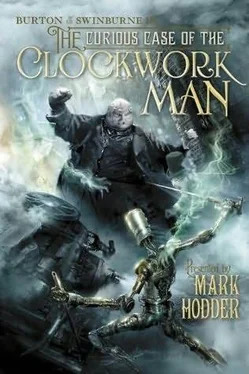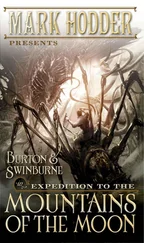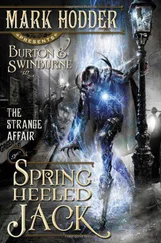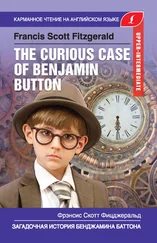Mark Hodder - The curious case of the Clockwork Man
Здесь есть возможность читать онлайн «Mark Hodder - The curious case of the Clockwork Man» весь текст электронной книги совершенно бесплатно (целиком полную версию без сокращений). В некоторых случаях можно слушать аудио, скачать через торрент в формате fb2 и присутствует краткое содержание. Жанр: Детективная фантастика, на английском языке. Описание произведения, (предисловие) а так же отзывы посетителей доступны на портале библиотеки ЛибКат.
- Название:The curious case of the Clockwork Man
- Автор:
- Жанр:
- Год:неизвестен
- ISBN:нет данных
- Рейтинг книги:3 / 5. Голосов: 1
-
Избранное:Добавить в избранное
- Отзывы:
-
Ваша оценка:
- 60
- 1
- 2
- 3
- 4
- 5
The curious case of the Clockwork Man: краткое содержание, описание и аннотация
Предлагаем к чтению аннотацию, описание, краткое содержание или предисловие (зависит от того, что написал сам автор книги «The curious case of the Clockwork Man»). Если вы не нашли необходимую информацию о книге — напишите в комментариях, мы постараемся отыскать её.
The curious case of the Clockwork Man — читать онлайн бесплатно полную книгу (весь текст) целиком
Ниже представлен текст книги, разбитый по страницам. Система сохранения места последней прочитанной страницы, позволяет с удобством читать онлайн бесплатно книгу «The curious case of the Clockwork Man», без необходимости каждый раз заново искать на чём Вы остановились. Поставьте закладку, и сможете в любой момент перейти на страницу, на которой закончили чтение.
Интервал:
Закладка:
“By George!” Sir Richard Mayne exclaimed. “How far into the future did your countess look?”
“Into the alternative -that is to say original -future, she saw clearly to the end of this century. After that, her vision became increasingly murky. There were certain points of interest that she focused on, the black diamonds being one of them, and she was able to follow those developments much farther through time, to the detriment of other matters. I should point out that she did so at great cost to herself and afterward collapsed with mental exhaustion. I suggest some sort of compensation from the government might be appropriate.”
“Be damned!” Palmerston exclaimed. “I'm going to employ the bloody sorceress! Pray continue, Captain.”
Burton cleared his throat and glanced at the contraption on the ceiling as it rotated to face him. “So Oxford journeyed back to 1840 and from there was thrown farther, to 1837, where he created an immediate paradox, for now the splinters of the South American stone existed twice in the same time. They were in his suit and they were also beneath the Tichborne estate. This caused them to resonate with each other, and because all three Eyes of Naga are chunks of the same aerolite, the Cambodian fragments started to resonate, too, producing the hum that led to their discovery. I'd wager the African diamond, wherever it is, also began to ‘sing.’
“Being underground, Tichborne's treasure couldn't be heard, but the reverberation caused the equivalent string in the family piano-B below middle C-to let loose frequent twangs.”
“Astonishing,” Cornewall Lewis grunted. “A man appears in London and, in Hampshire, Cambodia, and probably Africa, diamonds serenade his arrival!”
Burton nodded. “Yes, Mr. Secretary, astonishing indeed. But it's only half the story. I've spent the past few days in the British Library researching clairvoyance. Do you know when the first clear, incontrovertible evidence of mediumistic energies emerged?”
“When?”
“In 1837. Over the ensuing six years there were many recorded instances. They all coincided with periods when Spring Heeled Jack was active in our world. Then there were no more authenticated occurrences until last year. We now know that he jumped directly from 1843 to 1861. The diamonds in his suit have been here ever since, and genuine clairvoyant powers have been demonstrated with increasing frequency this past twelve months.”
Brunel clanged: “Then your hypothesis is that the diamonds’ resonance has awakened in the human brain some power that would otherwise have remained dormant?”
“That is for your scientists to explore,” Burton replied. “But in my opinion, etheric energy and all that goes with it is a product of the human organism and, yes, the resonance stimulates it.”
Spencer scribbled in a notebook and held it up, displaying a single word: Evolution?
Burton shrugged.
“Damnation!” Palmerston shouted. “If all that you say is true, bloody Rasputin would never have had the wherewithal to stick his confounded nose into our business had Oxford not done so first! Are we now so vulnerable to meddlers and madmen from the future?”
“It would seem so.”
An uneasy silence fell over the meeting. It ended with two words from Edward Seymour: “And Prussia?”
“Yes,” Burton said. “The countess saw.”
Another pause.
“Tell us,” said Palmerston, quietly.
“The World War was originally set to begin some fifty years from now. Oxford's actions have brought it forward by at least a decade.”
“Christ!”
“The countess described the sequence of events. This is what we can expect-”
For the next hour, Sir Richard Francis Burton described future history. He told the king, the politicians, and his companions how the Eugenicist exodus to Prussia would give that kingdom the means to gain dominance over the German Confederation, incorporating it into a greater union of the Germanic people. How Bismarck, to consolidate the southern borders of his new country, would declare war on France and defeat Napoleon III using biological weaponry developed from the plant life currently infesting Ireland.
He outlined the arms race between the Technologists of the British Empire and the Eugenicists of the Germans; the emergence of Friedrich Nietzsche as a visionary politician who would eventually overthrow Bismarck; and Germany's aggressive expansionist policies that would, inevitably, lead to conflict on a massive scale.
When he finished, the room sank into a deep silence and stayed there.
The politicians could not keep the horror from their faces. Even Palmerston's inexpressive facade had somehow become dominated by the shock in his eyes.
A minute ticked by, and then a voice came from the ceiling, amplified through a speaking trumpet in the mechanism above the table.
It said: “Make me a different future.”
The men looked at each other.
“I shall put my people to work at once,” Brunel clanged. “We can strengthen our navy; build an air force; design new weapons.”
“Good idea,” said Cornewall Lewis.
“Excellent,” said Edward Seymour.
“Absolutely not!” shouted Gladstone, who'd been assiduously avoiding Burton and Swinburne's eyes for the entire meeting. “How in blue blazes are we supposed to finance it?”
“Impractical and impossible,” Lord John Russell agreed. “We've only just avoided a revolution by the skin of our teeth. If we raise taxes we won't need Russian lunatics to start another one!”
“Besides which,” Palmerston added, “the whole damned world will say I'm warmongering. Starting an arms race now might precipitate the conflict even earlier!”
Herbert wrote something and held it up: Diplomacy.
Cornewall Lewis snorted: “With Germans?”
“I have an idea,” Swinburne said.
Palmerston jumped to his feet and kicked his chair backward. He clenched his hands together behind his back and paced up and down.
“What about allies, Burton?” he barked. “Did your sorceress suggest whom we might trust?”
“No, she didn't. I think we're on our own. Prime Minister, Algy can be quite insightful. I strongly suggest-”
“No! No! No! This is unacceptable! I will not go down in history as the man who lost the Empire!”
“Assuming you're still prime minister when it happens,” Sir Richard Mayne hissed quietly.
“-that you listen to what he has to say,” Burton finished.
His words were lost, for Palmerston had flown into one of his infamous rages. He kicked his chair across the floor, slapped a glass from the table, and yelled incoherently. His eyes were wild, yet through it all, his masklike face remained weirdly impassive.
The men waited for his tantrum to pass. It took three minutes before the prime minister seemed to suddenly deflate. He stood panting, glancing from man to man, his normally white features flushed.
“Madam Blavatsky used the diamonds to enhance her mediumistic talent,” Swinburne murmured. “And Richard used them to strengthen Countess Sabina's abilities.”
Palmerston gazed blankly at the diminutive poet. “What?”
“I'm merely suggesting that, if we ensure we possess all three Eyes of Naga, then perhaps we can gain the upper hand. We could recruit talented mediums and use the stones to accentuate their powers. We could divine the enemy's strategy. We could interfere with our opponents’ minds. We could wage a war of infiltration and enchantment. We could start now, and our enemies wouldn't even know that war was being waged upon them.”
Palmerston's mouth dropped open.
Burton said: “I told you he's worth listening to.”
The prime minister blinked rapidly, forced a breath out between his teeth, and pulled his snuffbox from his pocket. He went through his usual ritual, which ended, as always, with a prodigious sneeze, and peered at the poet with one straight eye, while the other slid upward disconcertingly.
Читать дальшеИнтервал:
Закладка:
Похожие книги на «The curious case of the Clockwork Man»
Представляем Вашему вниманию похожие книги на «The curious case of the Clockwork Man» списком для выбора. Мы отобрали схожую по названию и смыслу литературу в надежде предоставить читателям больше вариантов отыскать новые, интересные, ещё непрочитанные произведения.
Обсуждение, отзывы о книге «The curious case of the Clockwork Man» и просто собственные мнения читателей. Оставьте ваши комментарии, напишите, что Вы думаете о произведении, его смысле или главных героях. Укажите что конкретно понравилось, а что нет, и почему Вы так считаете.












